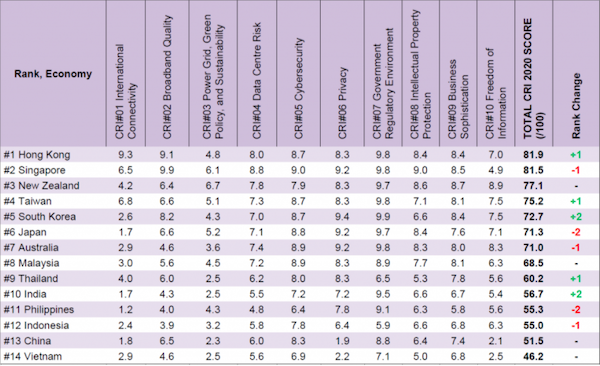Hong Kong reclaimed the title of strongest APAC cloud nation from Singapore
Hong Kong has reclaimed the lead over Singapore when it comes to cloud readiness in the Asia Pacific region (APAC), according to the Asia Cloud Computing Association (ACCA). In the ACCA’s 2020 cloud readiness index, Hong Kong received a total score of 81.9 out of 100, while Singapore received a 81.5.
While Hong Kong surpassed Singapore, both nations rank higher than the U.K. (79.7) and the U.S. (76.4).
The report further found that Australia dropped somewhat in readiness since the last report, while India advanced, and China maintained its low placement on the list. The top five is rounded out by New Zealand, Taiwan and South Korea. Japan, which ranked fourth two years ago, is now sixth.
When it comes to the specifics of cloud preparedness, Singapore scored an impressive 9.9 for broadband quality and 9.0 for IP protection, as well as 9.0 for cybersecurity, all of which are higher scores than those received by Hong Kong. However, because Hong Kong manages to snag consistently impressive scores in all categories, it remained in the number one position.

Most notably, Hong Kong received a 9.8 in government regulatory environment and a 9.3 in international connectivity, a significant lead over Singapore’s score of 6.5. Further, a number of nations performed poorly in this section, such as Japan (1.7), China (1.8) and South Korea (2.6).
Where Hong Kong struggled, though, is in the green policy and sustainability, only receiving a 4.8. Singapore, New Zealand, Taiwan and Japan all scored higher in this category.
The report indicated that emerging technologies like IoT, AI and mixed reality could help advance APAC nations in the area of cloud computing.
When it comes to economic recovery from the COVID-19 pandemic, the ACCA recommends that APAC economies create a conducive environment for “data-driven business of all types and sized to thrive.”
The ACCA also encouraged enacted policies and regulations that encourage “free and secure flow of data across borders and jurisdictions,” adding that doing so is essential to business and economic growth and recovery.

